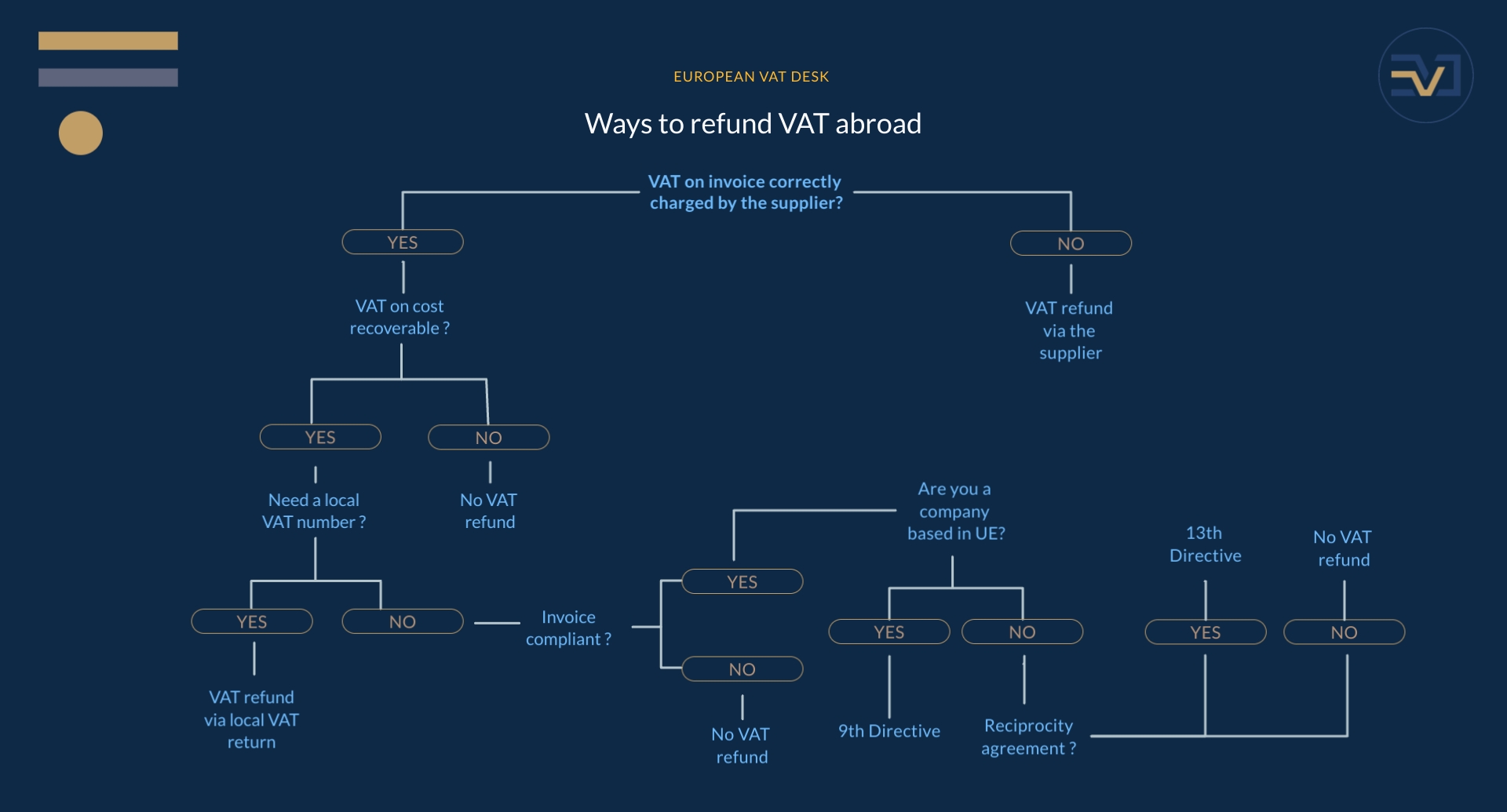The Authors of the Article
Angel Nadal & Amandine Foucart
How to get VAT refund abroad?
Does your company incur expenses abroad and wish to reclaim local VAT?
Follow our 6-questions method to maximize your chances of success:
- Has the foreign VAT been invoiced correctly?
- Is foreign VAT recoverable?
- Is the invoice compliant?
- Do you need a local VAT number?
- Is your company based in Europe?
- Is your company based outside the EU?

1. Has the foreign VAT been invoiced correctly?
This first question is often overlooked, but it's an important one. If the supplier invoices your company with local VAT that was not due, there's no point in claiming it back from the state involved, the claim will be rejected. In this case, the only option for recovering the VAT is to contact directly your supplier for a refund.
2. Is foreign VAT recoverable?
If the foreign VAT has been correctly applied by the supplier, the next step is to check the nature of the expenses. In some countries, VAT on so-called "mixed" (professional/private) expenses is not recoverable. These expenses generally include entertainment costs, vehicle expenses, and hotel and catering costs. In the absence of a right of deduction, it will not be possible to recover VAT on these expenses.
3. Is the invoice compliant?
To reclaim VAT on expenses, you need a compliant invoice. Tax authorities often refuse to reimburse VAT if certain information is missing, such as the customer's VAT number, address or a detailed description of the product or service. Check each invoice carefully and ask the supplier to correct any discrepancies in advance.
4. Do you need a local VAT number?
At this stage of the analysis, companies are often surprised by the conclusions. It is necessary to link the expenses incurred to an outgoing transaction in order to determine precisely the extent of VAT obligations in the country in question. If this analysis shows a VAT registration obligation, VAT recovery on the expenditure will then have to be carried out by means of a local VAT declaration.
5. Is your company based in Europe?
If your company does not need a local VAT number and is established in Europe, it can apply for a refund via a specific electronic procedure provided for in the Directive 2008/9. It is crucial to follow this procedure scrupulously, both in terms of form and content, in order to maximize your chances of reclaiming VAT. Numerous cases have been brought before the European Court of Justice on this subject. Even if some taxpayers see their situation resolved favorably, this often takes several years (sometimes up to ten). Consequently, submitting a refund claim is not a simple administrative process. It requires in-depth expertise to avoid potential obstacles that could arise during the refund process.
6. Is your company based outside the EU?
If your company is located outside Europe, check whether the country of refund has a reciprocity agreement. If not, the VAT on your expenses will not be recoverable and will constitute a cost. For example, an American company will not be able to recover VAT in Spain without such an agreement.
If a reciprocity agreement exists, the company can apply for a refund in accordance with the 13th Directive, either on paper or electronically, depending on the country. In Germany, one part of the claim is made online, the other by post. As you can see, the tax authorities will do everything in their power not to refund you.
The expert's eye
Reclaiming foreign VAT is a complex process, governed by strict regulations and precise procedures depending on the country concerned and the company's situation. The slightest error or omission in documentation or expenses analysis can jeopardize the right to reimbursement. It is therefore essential to prepare each step carefully, and to be aware of the specific conditions that apply.
Given the complexity and diversity of the rules in different countries, you should seek the advice of international tax experts to maximize your chances of success.